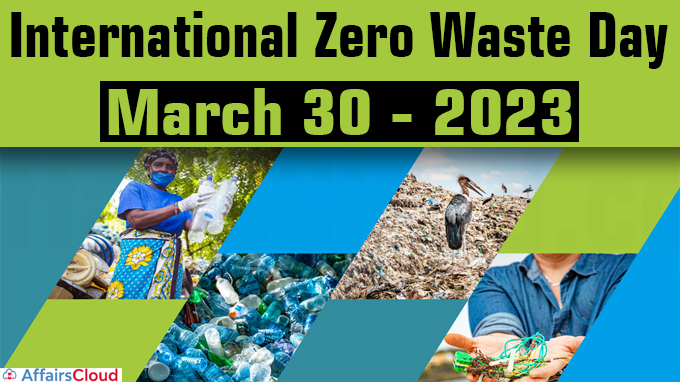 The United Nations(UN)’s first ever International Day of Zero Waste was observed on 30th March 2023 to create awareness about the importance of zero waste and encourage everyone to prevent and minimize waste and promotes a societal shift towards a circular economy.
The United Nations(UN)’s first ever International Day of Zero Waste was observed on 30th March 2023 to create awareness about the importance of zero waste and encourage everyone to prevent and minimize waste and promotes a societal shift towards a circular economy.
- The day also recognises the contribution of responsible consumption and production practices and urban waste management in achieving sustainable development goals(SDGs).
The day is jointly facilitated by the UN Environment Programme (UNEP) and the UN Human Settlements Programme (UN-Habitat).
Background:
i.The United Nations General Assembly(UNGA) adopted the resolution A/RES/77/161 on 14th December 2022 at its 77th session and proclaimed the 30th March of every year as the International Day of Zero Waste.
- This followed the other resolutions focused on waste, including “End plastic pollution: towards an internationally legally binding instrument”, adopted at the UN Environment Assembly on 2 March 2022.
ii.This resolution was proposed by Türkiye alongside 105 other countries.
Significance:
The day offers a platform to promote zero-waste initiatives and support to advance all the goals and targets in the 2030 Agenda for Sustainable Development, including SDG 11 and 12.
- These goals address all forms of waste, including food loss and waste, natural resource extraction and electronic waste.
Zero Waste Project:
Türkiye launched its zero-waste project in 2017 under the leadership of Her Excellency Emine Erdoğan, the First Lady of Türkiye, the wife of Recep Tayyip Erdoğan, President of Türkiye.
In 2022, the First Lady of Türkiye and the UN Secretary-General António Guterres signed a goodwill document to extend the country’s zero-waste project globally.
Importance of Zero Waste:
The waste sector contributes to the triple planetary crisis of climate change, biodiversity and nature loss, and pollution.
Every year, humanity generates around 2.24 billion tons of municipal solid waste. Only 55% of these are managed in controlled facilities.
Annually, more than 931 million tons of food is wasted and around 14 million tons of plastic waste enters aquatic ecosystem.
Adopting zero waste:
The zero waste approach includes responsible production, consumption and disposal of products in a closed, circular system.
Under this approach, resources are reused or recovered as much as possible to minimize the pollution to air, land or water.
About United Nations Environment Programme (UNEP):
Executive Director– Inger Andersen
Established in 1972
Headquarters– Nairobi, Kenya




